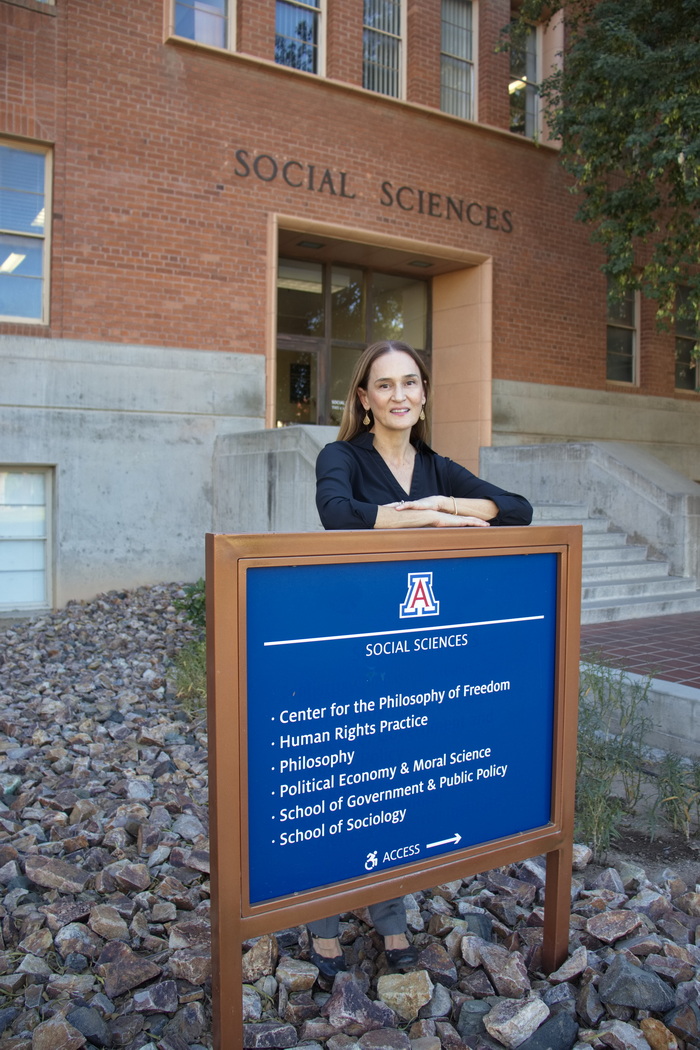Economist and Freedom Center Fellow C. Monica Capra Explores Barriers to Open Dialogue at UA Freedom Center
Why do people avoid information that challenges their beliefs? How can we encourage open dialogue on controversial issues? These are some of the questions that economist C. Mónica Capra, a visiting fellow at the University of Arizona’s Freedom Center, is exploring. Capra, a professor of Economic Sciences at Claremont Graduate University, is currently visiting as part of the Freedom Center’s Visiting Fellows Program. This program serves as a catalyst for intellectual exchange, connecting leading scholars like Capra with the vibrant UA community and granting them dedicated time and resources to advance their research while enriching the university’s academic environment.
Capra is using her time on campus to focus on her research into motivated reasoning and self-perception, and to get feedback on new research involving AI and synthetic cultural agents.
Capra is a behavioral and experimental economist. Behavioral and experimental economists study how psychological, social, and cultural factors influence economic decision-making, often challenging traditional models that assume fully rational behavior. They use controlled experiments to test theories, observe behavior, and explore deviations from standard economic predictions. Capra’s work emphasizes interdisciplinarity. She has collaborated with neuroscientists, data scientists, and psychologists to produce groundbreaking work at the intersection of economics and these fields.

We sat down last week to talk to Capra about her decades of research as well as what she is currently working on (see a short video of the interview here). During her visit, Monica submitted two papers she had been working on! One paper was submitted to the European Economic Review and the other to the American Economic Review, Insights; look for those articles early next year once they are published! “One of the papers is on using AI, specifically large language models (LLMs), to model specific groups and create synthetic agents representative of those groups,” Capra explained. This involves using artificial intelligence, specifically large language models like ChatGPT, to create synthetic agents that can simulate the economic behavior of different demographic groups. This innovative approach allows researchers to test economic hypotheses and explore the potential impacts of policy interventions in a virtual environment. By leveraging AI, researchers can conduct these studies more efficiently and avoid the ethical complexities of human subject research. This intersection of technology and economics represents a promising new frontier for the field.
We are fortunate to have Capra as one of our Freedom Center Fellows because her research so closely aligns with our mission and goals. For example, one area Capra explores is the fascinating insights into human behavior through the lens of behavioral economics, focusing on prosocial behavior (like volunteering) and information consumption. Her work delves into how individuals engage in “self-signaling” – actions that help people understand and reinforce their own moral identity. Through her experimental research, she has discovered intriguing patterns, such as people’s tendency to make generous pledges but then find excuses not to follow through, and their reluctance to examine information that might contradict their self-perception.
“This area of research will give a kind of a deeper understanding for why these conversations are difficult and if it’s taught to the students that this is the reason why they’re difficult I think they would be more open to engaging in open discussion”
Capra’s research directly supports the Freedom Center’s mission by helping us understand the psychological barriers that hinder open and respectful dialogue. By studying concepts like self-signaling, “moral wiggle room” and information avoidance, she sheds light on the complex mental mechanisms that make people resistant to engaging with viewpoints different from their own. Understanding these motivations can help individuals become more aware of their biases and engage in more constructive conversations, even when faced with differing perspectives. “This area of research will give a kind of a deeper understanding for why these conversations are difficult and if it’s taught to the students that this is the reason why they’re difficult I think they would be more open to engaging in open discussion” noted Capra. This research contributes significantly to the Center’s goal of fostering a deeper understanding of the elements that shape individual and societal prosperity by exploring the psychological and philosophical underpinnings of human behavior and its impact on social interaction.
In addition to furthering her research and finalizing and submitting papers during her visit, Capra is collaborating with UA faculty to dive deeper into her latest research. One of her goals is to brainstorm ideas on validating synthetic cultural agents with new data, a topic she began exploring in a fascinating discussion with Maria Porter, a colleague at the Freedom Center. Capra is also refining her thoughts on motivated reasoning and self-perception, which influence our choices to consume or avoid information. At the Freedom Center, she finds a welcoming environment for these intellectual explorations, with colleagues offering critical perspectives on economic models and assumptions.
Capra has also had the opportunity to connect with the UA economics faculty, who have a long-standing reputation in experimental economics. She is particularly thrilled to spend time with Charles Noussair, a renowned experimental economist, whose insights have further enriched her visit. When not engaging in research or academic discussions, Capra enjoys exploring the natural beauty of Tucson. She has found inspiration in the landscapes of Saguaro National Park, a place that, with its unique beauty and complexity, sparks her creativity.
To bridge the gap between theory and practice, I asked Capra for her top strategies to encourage open and respectful dialogue, grounded in her research findings, and she offered three helpful tips.
Her first tip isn’t based on her research; however, she has found this one to be a good rule in any conversation, and that is the 80/20 rule where you listen 80% and talk 20%.
Her second tip emphasized the importance of self-awareness in overcoming confirmation biases and information avoidance. “People often fall into information bubbles, consuming only what aligns with their beliefs—a tendency known as confirmation bias. On the flip side, there’s information avoidance, where individuals actively avoid anything that might challenge their views. Being aware of these biases is the first step to having more open and meaningful discussions.”
Capra’s third tip for fostering healthy discussions is to approach conversations with a scientific mindset. She explains that science is a process of constantly searching for the truth, rather than claiming to possess it. “It’s unscientific to say, ‘I have the truth,’” she notes, emphasizing the importance of humility in the learning process. This can be especially challenging for younger individuals, who may be prone to overconfidence. However, Capra believes professors have a unique opportunity to teach students that humility is a key part of growth and understanding, encouraging them to approach discussions with an open mind and a willingness to learn.
Capra’s time at the University of Arizona is a testament to the Freedom Center’s mission, which aims to foster constructive conversations and understanding across diverse perspectives. Her exploration of the psychological barriers to open dialogue provides valuable tools for navigating difficult discussions and promoting intellectual exchange within the university community and beyond. Thank you for visiting our campus and our Freedom Center and we look forward to your next visit Monica!


